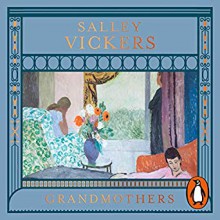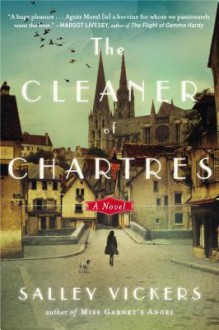

Door 10: Russian Mothers' Day
Book: Read a book featuring a character who is a mother.
"Grandmothers" is one of those books that makes me want to shout, "THIS! THIS is what makes reading such a gift." Salley Vickers' writing lit up my imagination, making me feel insightful and connected and sad and refreshed and better equipped to deal with my life as I flew on the borrowed wings of her words.
The book shares moments from the lightly interconnected lives of three grandmothers, initially strangers to each other, as they spend time with their grandchildren and with each other.
Salley Vickers showed a remarkable ability to take me inside the heads of thoroughly imagined women, with very different backgrounds and current circumstances, and keep me interested in each of them. There's none of that "Oh dear, do we HAVE to go back to THIS character now?" that I sometimes get when one character is less interesting than the others.
For once, the publisher's summary describes these three women well:
"fiercely independent Nan, who leads a secret life as an award-winning poet when she is not teaching her grandson Billy how to lie; glamorous Blanche, deprived of the company of her beloved granddaughter Kitty by her hostile daughter-in-law, who finds solace in rebelliously taking to drink and shoplifting; and shy, bookish Minna who in the safety of shepherd's hut shares with her surrogate granddaughter Rose her passion for reading."
There are some big themes here about being a mother and a grandmother, about being old, about being alone and about being aware on a daily basis of one's mortality but the power of the book is that it doesn't start there. It starts with the people. You feel as though the issues arise only because of who the people are rather than that the people have been created to illuminate the issues.
I felt most at home with Nan. I admired the way she confronted the world rather than hiding from it. I was pleased by the realistic way in which Nan's introversion and natural inclination for solitude were described as a facet of her personality and not as an issue to be managed. The quietly comfortable image of Nan's made-to-measure wicker coffin, standing in her living room, doing service as a bookshelf until she needs to use it, captured a lot of how I feel about death.
This is a book full of strong emotions and scenes that feel as strong as my own memories. It's also a book that gave me two new (to me) tools for understanding what is going on around me.
The first is the metaphor of "The Leper's Squint" as a means of grappling with the diversity of way in which we experience life. I've put a slightly longer than usual quotation in here because I think it demonstrates the style of the book as well as articulating the concept. Nan and her grandson, Billy, have been at the seaside. While Billy was digging in the sand, Nan used a phrase from my childhood, "If you keep digging like that, you'll reach Australia." Billy, who is clever and curious but has a tendency to be literal, finds this statement to be absurd. Nan comes back to it when the two of them are having fish and chips a little later.
One of the truths Nan had divined early is that it is the hardest thing in the world to grasp that other people see life from a perspective often quite unlike one's own. "The trouble is, we all see through our own Leper's Squint", she had once said to her husband, who had confirmed the point by asking what on earth she was on about. She tried out the same idea on their grandson.
"What's a Leper's Squint?" he asked, as she had hoped he might.
"You know about leprosy?"
"When bits of you drops off?"
"Well not as bad a that but horribly certainly. In the days when leprosy was common and people were afraid it was catching, there were tiny windows made in churches so the lepers could see into the church while the Mass was being said. Mass is a name for a church service." she added hastily.
"Why did they want to?"
"Why did the lepers want to see into the church?"
"Yes. What did they want to do that for?"
"In those days, most people believed in God."
Billy dipped a chip into some tomato ketchup while he pondered this.
"Why?" he asked again.
"That's what I was trying to explain. It was normal then to believe in God and not being allowed to mingle with the other people in the church, they saw as a terrible consequence of the illness. Nowadays, it's more normal not to believe. They, the lepers and the other folk would have found it weird, as you would say, not to believe in God, while I think you find it weird that they did."
Though of this, she wasn't sure. Billy sometimes interrogated her views on religious questions and she welcomed that. She was open to doubt herself. She continued on more substantial ground.
"You see, pet, in your way of thinking, it's ridiculous to suppose that by digging a hole you could reach Australia, but in my world, I like to imagine that I could."
"Even if you knew that you really couldn't?"
"Yes," Nan said.
Aside from loving him, this was what she liked best about her grandson. He was willing to explore things.
"Even though, with another part of my mind, I knew quite well that I couldn't".
I will tuck this metaphor away and challenge myself to look through other people's Leper's Squints from time to time and to be aware of the limited view from my own.
The second new-to-me concept, also introduced by Nan, was interanimation. I had to look it up. Now I have a word for it, I'm seeing it everywhere and I realise that it's one of the few things that gets stronger as I get older. Here's how the concept is explained. Nan wakes in the night in a holiday cottage and looks out the window:
Moonlight was silver-plating the grass. A full moon, vast and auspicious-seeming, was hanging like a child's lost balloon in a darkly violet sky. She'd stolen that image from someone. Who the hell was it?
That was one of the snags of age. that who you were and what you'd been and what you'd done, read or been told had become so interanimate that there was no telling any more what was what.
Interanimate. There, a case in point. But what does it matter, Nan thought, as she trod wearily of hidden perils, malicious stair-rods for example, down dusty stairs to a kitchen with a And who would care anyway?"
"Grandmothers" is a beautiful example of perfectly executed, authentic, insightful and compassionate interanimation.
My enjoyment of the book was greatly increased by Barbara Flynn's narration. If you have the opportunity, I strongly recommend listening to the audiobook version of "Grandmothers".

 Log in with Facebook
Log in with Facebook 








